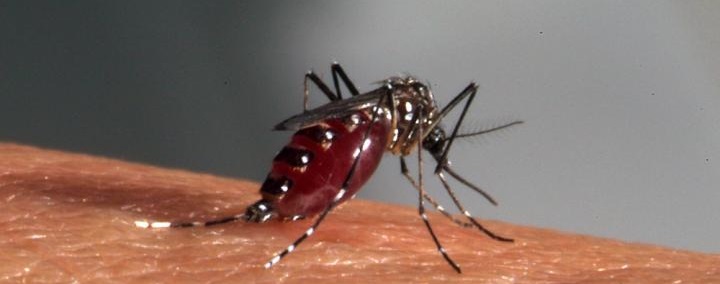The Institut Pasteur in French Guiana publishes the first complete genome sequence of the Zika virus
Having confirmed the first cases of infection in Suriname then in French Guiana, the Institut Pasteur in French Guiana has sequenced the complete genome of the
Zika virus, which is responsible for an unprecedented epidemic currently sweeping through the tropical regions of the Americas. Published in The Lancet medical journal, the analysis of this sequence shows almost complete homology with the strains responsible for the epidemic that occurred in the Pacific in 2013 and 2014.
Last November, following a request by colleagues in Suriname, the team from the Virology Laboratory at the Institut Pasteur in French Guiana -- a National Reference Center for Arboviruses for the Antilles-French Guiana region -- confirmed the first five indigenous cases of infection by the Zika virus in Suriname. Researchers from the Institut Pasteur in French Guiana have just mapped the complete genome sequence of this viral strain using one of these five samples. The analysis of this genome, which features in The Lancet today, shows that it belongs to the Asian lineage and presents over 99% homology with the strain responsible for the epidemic in French Polynesia in 2013. "Until now few complete sequences of this virus and none of the strains currently circulating in South and Central America were available. This complete sequence of the virus is a major starting point for shedding light on how its behavior develops", points out Dominique Rousset, Head of the Virology Laboratory and National Reference Center for Arboviruses at the Institut Pasteur in French Guiana.
The first cases were confirmed in Brazil in May 2015 and the country is currently experiencing the largest epidemic ever recorded with 440,000 to 1,300,000 suspected cases reported by the Brazilian health authorities. The Zika virus has spread quickly, affecting 10 countries in the tropical regions of the Americas as well as the Caribbean so far. While until recently the infection was considered harmless, the Zika virus epidemic which raged in French Polynesia and the Pacific in 2013-2014 was accompanied by an increase in serious neurological complications, such as Guillain-Barre syndrome and congenital neurological defects. In Brazil, the very significant increase in the number of microcephaly cases in fetuses whose mothers were infected during pregnancy forced the government to declare a state of emergency in December 2015. "Are these defects caused by the Zika virus alone, the co-circulation of other infectious agents or other factors? Multidisciplinary research projects will need to be set up to answer these questions. We are already trying to improve our knowledge of this virus and understand its development, primarily by building on diagnostic tools" explains Dominique Rousset.
In addition, a team of four researchers from the Institut Pasteur in Dakar arrived in Sao Paulo on January 5th, to help Brazilian scientists deal with the Zika epidemic.
To date, 17 cases have been confirmed in French Guiana and three in Martinique. Given the very rapid spread of the Zika virus, the Institut Pasteur in French Guiana remains actively involved in epidemiological monitoring, alongside the health authorities and the Institut Pasteur International Network. "We are committed to supporting vector control by monitoring resistance to insecticides, as part of an agreement with the Regional Health Agency. Research into the impact of this resistance on the vectorial competence of Aedes aegypti populations for various arboviruses, including the Zika virus, is also being conducted at the Vectopole", adds Isabelle Dusfour, entomologist at the Institut Pasteur in French Guiana.
Described for the first time in Uganda in 1947, Zika is an arbovirus belonging to the same family as the dengue virus and is spread by the same vector, the Aedes aegypti mosquito.
It can also be spread by the tiger mosquito, Aedes albopictus, which is present in some regions in mainland France. Under the supervision of entomologist Anna-Bella Failloux, responsible for the Arboviruses and Insect Vectors Unit, the Institut Pasteur is currently conducting research in Paris to assess the vectorial competence of Aedes aegypti and Aedes albopictus, and ascertain the role of these two species in the dynamics of the Zika epidemic. This work will help to better assess the risk of the virus being introduced to France.
Source: Institut Pasteur
Microbiology
-
New genus of bacteria found living inside hydraulic fracturing wells
-
New clues found to how 'cruise-ship' virus gets inside cells
-
Discovery of new hepatitis C virus mechanism
-
Mouse antibodies pinpoint Zika's weak spots
-
Cracking the mystery of Zika virus replication
-
Researchers map Zika's routes to the developing fetus
-
How a cold gets into cells
-
Protein structure paves the way for new broad spectrum antifungals
-
The Institut Pasteur in French Guiana publishes the first complete genome sequence of the Zika virus
-
Penn study reveals how fish control microbes through their gills
-
Bacteria take 'RNA mug shots' of threatening viruses
-
Algae use their 'tails' to gallop and trot like quadrupeds
-
Discovery shows how herpes simplex virus reactivates in neurons to trigger disease
-
Intestinal worms 'talk' to gut bacteria to boost immune system
-
Deep-sea bacteria could help neutralize greenhouse gas, researchers find



